Sponsored Content
Austria Strengthens Security Partnerships with the United Kingdom and Germany
Austria has deepened its bilateral relations with the United Kingdom and Germany in a series of important security policy consultations. The high-level talks focused on current security policy challenges, strategic interests, and strengthening defense cooperation in a changing global environment.
 Austria is committed to maintaining its international security partnerships and contributing to broader European efforts to jointly address present and future complex challenges. / Picture: © Bundesheer/Harald MINICH
Austria is committed to maintaining its international security partnerships and contributing to broader European efforts to jointly address present and future complex challenges. / Picture: © Bundesheer/Harald MINICH
Security policy consultations between Austria and the United Kingdom took place at the British Ministry of Defense in London. The Austrian delegation was led by Secretary General Dr. Arnold Kammel, while Sebastian Carr, Deputy Head of the Department for European-Atlantic Security Policy, led the British side. Experts from the fields of strategy, the Western Balkans, and the British…
or Log In
Fast News Search





